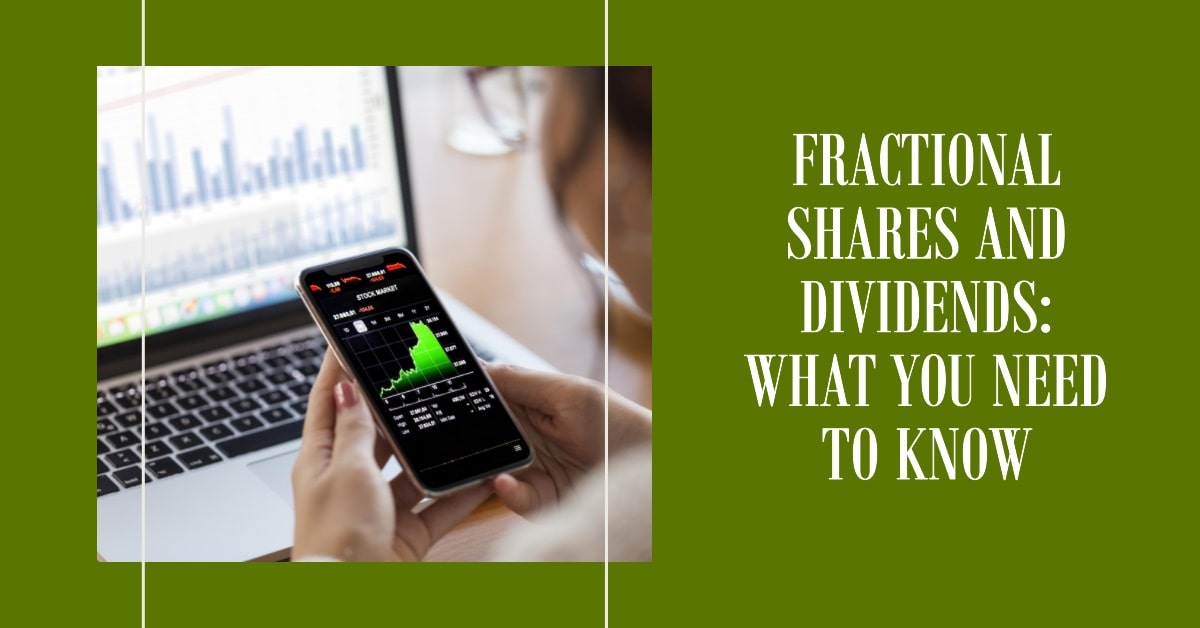Introduction
Investing in the stock market can be an effective way to grow wealth and generate income. However, not everyone has the capital to purchase full shares of stock. This is where fractional shares come into play. Fractional shares allow investors to purchase a portion of a share of stock, making investing more accessible to a broader range of people. But, do fractional shares pay dividends? This article will explore the concept of fractional shares and whether or not investors can expect to receive dividends from their fractional share investments.
What Are Fractional Shares?
Fractional shares, also known as partial shares, are portions of a whole share of stock. They allow investors to own a fraction of a stock rather than a whole unit. For example, if a single share of a company’s stock is priced at $100, investors can purchase a fraction of that share, such as 0.5 or 0.75 shares, for a proportionate price.
How Do Fractional Shares Work?
Investors can acquire fractional shares through various means, such as stock splits or stock acquisition by a company. Fractional shares are typically acquired through brokerage firms or investment platforms that offer the option to buy and sell fractional shares.
Advantages of Fractional Shares
One of the primary advantages of fractional shares is that they provide access to high-priced stocks that may be otherwise unaffordable. Investors can diversify their portfolios and invest in a broader range of companies, even with limited funds. Fractional shares also allow for more precise portfolio management and the ability to reinvest dividend payments.
Do Fractional Shares Pay Dividends?
When it comes to investing in fractional shares, one common question that arises is whether these partial shares are eligible to receive dividends. Dividends are a portion of a company’s profits that are distributed to its shareholders, typically in the form of cash payments or additional shares of stock. To understand whether fractional shares pay dividends, it is important to consider several factors.
Factors That Determine Whether Fractional Shares Pay Dividends
Company Policy
One of the main factors that determine whether fractional shares pay dividends is the company’s policy regarding dividend payments. Some companies may choose to pay dividends only to shareholders who own full shares, while others may include fractional shareholders in their dividend distribution. It is important to research and understand the specific policies of the company you are investing in.
Stock Splits
Stock splits can also impact whether fractional shares pay dividends. In a stock split, a company increases the number of shares outstanding by dividing existing shares into multiple shares. For example, in a 2-for-1 stock split, each existing share is split into two shares. If you own a fractional share prior to a stock split, you may receive additional fractional shares or a cash equivalent. Whether these additional fractional shares or cash equivalents are eligible for dividend payments will depend on the company’s policy.
Stock Acquisition or Merger
In the event of a stock acquisition or merger, the acquiring company’s policy may determine whether fractional shares pay dividends. The acquiring company may choose to convert fractional shares into cash or whole shares, which would then be eligible for dividend payments according to their policy. It is important to understand the terms of any stock acquisition or merger and how it may impact your fractional share holdings and potential dividend earnings.
Stockholders’ Rights
Stockholders’ rights can also influence whether fractional shares pay dividends. In some cases, fractional shareholders may have limited or no voting rights, which may affect their eligibility for dividends. It is essential to review the stockholders’ rights documentation provided by the company to determine the rights and privileges associated with fractional share ownership.
Dividend Yields
Lastly, dividend yields may vary depending on the size of your fractional share holdings. Dividend yields are calculated by dividing the annual dividend per share by the stock price. If you own a small fraction of a share, your dividend yield may be proportionally smaller compared to someone who owns a whole share. However, this may not be a determining factor in whether fractional shares pay dividends, as it primarily affects the amount of dividend income rather than the eligibility for dividend payments.
In conclusion, whether fractional shares pay dividends depends on various factors such as the company’s dividend policy, stock splits, stock acquisitions or mergers, stockholders’ rights, and dividend yields. It is crucial to research and understand these factors before investing in fractional shares and to consult with a financial advisor if needed.
The Benefits of Owning Fractional Shares
Diversification
Owning fractional shares allows investors to diversify their portfolios with a smaller investment. Instead of putting all their money into one or a few stocks, investors can spread their investments across multiple companies or sectors. This diversification helps to reduce the risk associated with investing in individual stocks.
Access to High-Priced Stocks
Investors may be interested in owning shares of a high-priced stock but may not have the funds to buy a full share. Fractional shares allow investors to own a portion of these high-priced stocks without needing a large amount of capital. This gives investors the opportunity to participate in the potential growth and dividend payments of these stocks.
Reinvesting Dividends
Dividends received from fractional shares can be reinvested into additional fractional shares. This allows investors to compound their investment over time, potentially increasing their overall return. By reinvesting dividends, investors can take advantage of the power of compounding and potentially grow their wealth more quickly.
Flexibility in Portfolio Management
Owning fractional shares provides flexibility in managing a portfolio. Investors can easily adjust their holdings by buying or selling fractional shares, allowing them to align their investments with their investment objectives and market conditions. This flexibility allows investors to make adjustments as needed, without the high transaction costs associated with buying or selling full shares.
Lower Barrier to Entry
Fractional shares help lower the barrier to entry for investing in the stock market. Instead of needing a significant amount of capital to buy full shares, investors can start investing with a smaller amount of money. This makes investing in the stock market more accessible to a wider range of individuals, including those with limited funds or who are just starting their investment journey.
Participation in Stock Splits
When a company undergoes a stock split, existing shareholders may receive additional shares. Fractional share owners are also entitled to receive these additional shares, allowing them to benefit from the stock split just like shareholders who own full shares. This can increase the value of the investment and potentially result in higher dividend payments in the future.
Overall, owning fractional shares provides investors with various benefits, including diversification, access to high-priced stocks, the ability to reinvest dividends, flexibility in portfolio management, a lower barrier to entry, and participation in stock splits. These advantages make fractional shares an attractive option for individuals looking to invest in the stock market with limited capital.
Understanding the Risks of Fractional Shares
Market Volatility
Investing in fractional shares can expose investors to market volatility. As fractional shares represent a portion of a whole share, the value of the fractional share can fluctuate with the overall market conditions. This means that the value of your fractional share may go up or down, impacting your potential returns and dividends.
Liquidity Concerns
Fractional shares may have lower liquidity compared to whole shares. This means that there may be fewer buyers and sellers for fractional shares, making it potentially more difficult to buy or sell them at desired prices. This could pose challenges when it comes to realizing your investment or taking advantage of dividend payments.
Limited Voting Rights
When you own fractional shares, you typically have limited voting rights compared to shareholders with whole shares. This means that as a fractional shareholder, you may not have the same level of influence or decision-making power when it comes to matters requiring shareholder approval, including dividend policies. It’s important to consider this aspect if having a say in the company’s dividend payments is important to you.
Dividend Reinvestment
Dividend reinvestment plans (DRIPs) allow shareholders to automatically reinvest their dividends into additional shares of stock. However, not all fractional shares are eligible for dividend reinvestment. Some companies may exclude fractional shareholders from participating in their DRIPs, limiting your ability to benefit from compounding returns through dividend reinvestment.
Fractional Share Fees
Some brokerage platforms may charge fees for trading and holding fractional shares. These fees could eat into your dividend earnings, especially if you hold a small amount of fractional shares. Be sure to understand any fees associated with fractional share investing and factor them into your overall investment strategy.
Tax Considerations
Fractional share ownership can add complexity to your tax situation. Depending on your jurisdiction’s tax laws, you may need to report and pay taxes on dividend income earned from fractional shares. It’s essential to consult with a tax professional to ensure you understand the tax implications of owning fractional shares and accurately comply with your tax obligations.
Overall, while fractional shares offer opportunities to invest in companies with lower investment amounts, it’s crucial to be aware of the risks involved. Understanding market volatility, liquidity concerns, limited voting rights, potential limitations on dividend reinvestment, fees, and tax considerations can help you make informed decisions about investing in fractional shares and managing your dividend expectations.
Conclusion
In conclusion, fractional shares can indeed pay dividends. However, whether or not a fractional share receives dividends depends on several factors. One of the main factors is the policy of the company in question. Some companies may choose not to pay dividends to fractional shareholders, while others may do so. Additionally, the specific brokerage or platform through which the fractional shares are purchased may also have its own policies regarding dividend payments.
While fractional shares may not receive the same dividend amount as a full share, they still offer an opportunity for investors to earn income from their investments. Fractional shares provide a more accessible way for individuals to invest in companies, even if they cannot afford a full share. This allows investors to diversify their portfolios and potentially benefit from dividend income without needing a significant amount of capital.
It is important for investors to research and understand the terms and conditions of investing in fractional shares, including the dividend policies, before making any investment decisions. By being informed about the potential dividend payments and the risks associated with fractional shares, investors can make more educated choices to suit their financial goals and preferences.
FinBrain Technologies
www.finbrain.tech
[email protected]
99 Wall St. #2023 New York, NY 10005
Twitter • LinkedIn • Instagram • Facebook


Leave a Reply